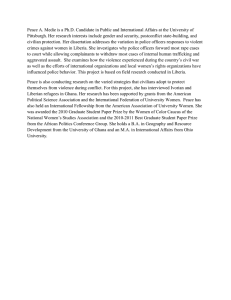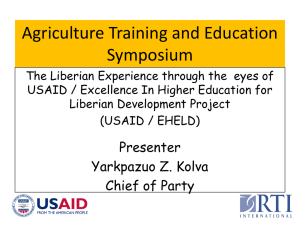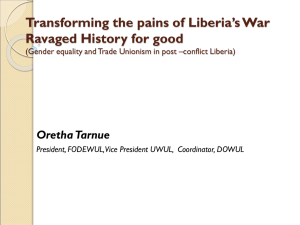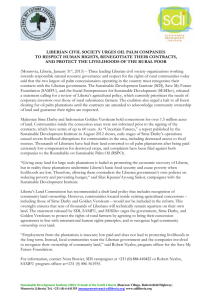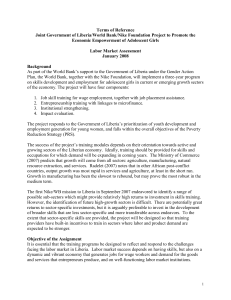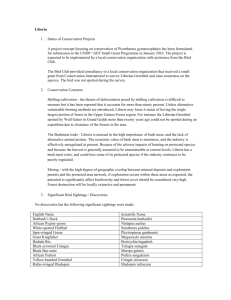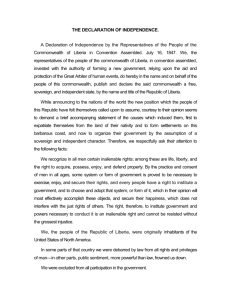F Making Liberia Safe Through Comprehensive Security-Sector Reform June 2007
advertisement
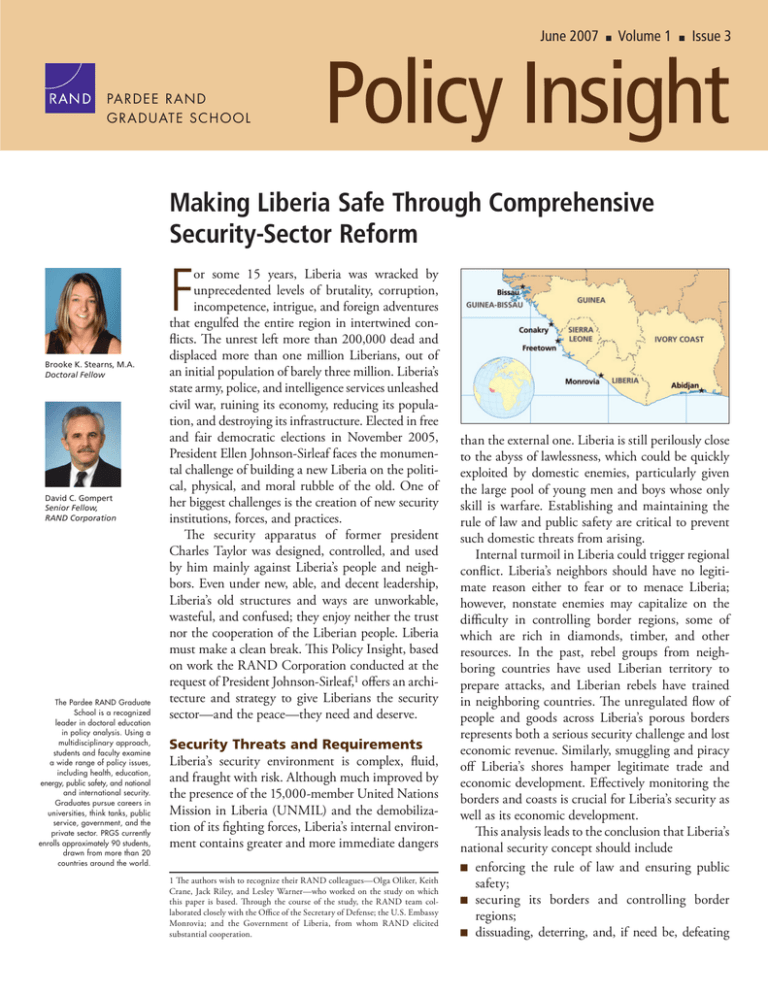
June 2007 PARD E E RA N D GR AD U AT E SC H OOL O Volume 1 O Issue 3 Policy Insight Making Liberia Safe Through Comprehensive Security-Sector Reform F Brooke K. Stearns, M.A. Doctoral Fellow David C. Gompert Senior Fellow, RAND Corporation The Pardee RAND Graduate School is a recognized leader in doctoral education in policy analysis. Using a multidisciplinary approach, students and faculty examine a wide range of policy issues, including health, education, energy, public safety, and national and international security. Graduates pursue careers in universities, think tanks, public service, government, and the private sector. PRGS currently enrolls approximately 90 students, drawn from more than 20 countries around the world. or some 15 years, Liberia was wracked by unprecedented levels of brutality, corruption, incompetence, intrigue, and foreign adventures that engulfed the entire region in intertwined conflicts. The unrest left more than 200,000 dead and displaced more than one million Liberians, out of an initial population of barely three million. Liberia’s state army, police, and intelligence services unleashed civil war, ruining its economy, reducing its population, and destroying its infrastructure. Elected in free and fair democratic elections in November 2005, President Ellen Johnson-Sirleaf faces the monumental challenge of building a new Liberia on the political, physical, and moral rubble of the old. One of her biggest challenges is the creation of new security institutions, forces, and practices. The security apparatus of former president Charles Taylor was designed, controlled, and used by him mainly against Liberia’s people and neighbors. Even under new, able, and decent leadership, Liberia’s old structures and ways are unworkable, wasteful, and confused; they enjoy neither the trust nor the cooperation of the Liberian people. Liberia must make a clean break. This Policy Insight, based on work the RAND Corporation conducted at the request of President Johnson-Sirleaf,1 offers an architecture and strategy to give Liberians the security sector—and the peace—they need and deserve. Security Threats and Requirements Liberia’s security environment is complex, fluid, and fraught with risk. Although much improved by the presence of the 15,000-member United Nations Mission in Liberia (UNMIL) and the demobilization of its fighting forces, Liberia’s internal environment contains greater and more immediate dangers 1 The authors wish to recognize their RAND colleagues—Olga Oliker, Keith Crane, Jack Riley, and Lesley Warner—who worked on the study on which this paper is based. Through the course of the study, the RAND team collaborated closely with the Office of the Secretary of Defense; the U.S. Embassy Monrovia; and the Government of Liberia, from whom RAND elicited substantial cooperation. than the external one. Liberia is still perilously close to the abyss of lawlessness, which could be quickly exploited by domestic enemies, particularly given the large pool of young men and boys whose only skill is warfare. Establishing and maintaining the rule of law and public safety are critical to prevent such domestic threats from arising. Internal turmoil in Liberia could trigger regional conflict. Liberia’s neighbors should have no legitimate reason either to fear or to menace Liberia; however, nonstate enemies may capitalize on the difficulty in controlling border regions, some of which are rich in diamonds, timber, and other resources. In the past, rebel groups from neighboring countries have used Liberian territory to prepare attacks, and Liberian rebels have trained in neighboring countries. The unregulated flow of people and goods across Liberia’s porous borders represents both a serious security challenge and lost economic revenue. Similarly, smuggling and piracy off Liberia’s shores hamper legitimate trade and economic development. Effectively monitoring the borders and coasts is crucial for Liberia’s security as well as its economic development. This analysis leads to the conclusion that Liberia’s national security concept should include O enforcing the rule of law and ensuring public safety; O securing its borders and controlling border regions; O dissuading, deterring, and, if need be, defeating any organized internal threats that may arise; and O preparing to defend against external aggression by states or, more likely, nonstate actors. These concepts should guide the formation and use of new forces and of new institutions to manage those forces. New Security Forces To be successful, any nation’s security sector should have coherence, legitimacy, effectiveness, and affordability. Liberian security forces must be designed to meet these four criteria. The largest and most crucial components of Liberia’s security sector are the Liberia National Police and the Armed Forces of Liberia, for internal and external security, respectively. The primary missions of the Liberia National Police should be (a) to prevent and fight crime and (b) to maintain public safety. These missions call for a light but sizable community-friendly police force of demonstrated integrity that can earn the confidence and cooperation of the Liberian people. The primary missions of the Liberian military should be (a) to safeguard the country against possible external threats and (b) to support the police forces in defeating any insurgency or other internal threat that exceeds police capabilities. The size of the military is less important than that it be superior in quality, capability, and mobility to all foreseeable threats. 14,000 Number of Personnel 12,000 10,000 8,000 6,000 4,000 2,000 0 Current Police 2 1 Ancillary Police 2 QRPU Figure 1. Force Size Options 3 Army Coast Guard In view of Liberia’s security demands, especially the danger of armed internal opposition, this force structure can be enhanced by including in the national police a small, mobile, high-performance police unit capable of (a) helping regular police meet heightened internal dangers, (b) challenging armed groups that form in defiance of the state’s authority, and (c) “swinging” to support the military forces, if need be, to meet major internal or external threats. This quick-response police unit (QRPU) should be oriented toward law enforcement but also prepared for light combat operations. This architecture should provide flexibility, speed, and capabilities superior to any foreseeable threat. The QRPU would permit the regular police to be lightly armed and community oriented, and it would reduce the state’s reliance on military intervention to quell domestic threats. Liberia’s core security functions also indicate a need for a modest coast guard, a customs and immigration service, and the Special Security Service to protect national leaders. Existing Liberian-UN-U.S. plans are to build a small police force and a small military (see Figure 1, Option 1). This could prove inadequate to meet Liberia’s needs. However, simply expanding the size of these two forces (Option 2) is costly and may not address the security threats. Adding a QRPU and a coast guard to small but capable police and military forces (Option 3) would be a wise investment for Liberia and its supporters, yielding effective security on an economical operating basis. The additional costs of this third option would be about $35 million in capital costs and $6 million in annual operating costs above the existing plan.2 By opting for small but capable forces, Liberia would be able to concentrate on their quality, which can enable the state to overmatch the irregular militias and warlord armies that typify the threats to Liberian security. This force structure would cover the full spectrum of internal and external dangers, including those of armed gangs and insurgency, and it would maintain a high threshold for domestic use of the army. 2 The CIA World Factbook estimates Liberia’s 2006 GDP at $902.9 million. Option 3 would increase Liberia’s capital military expenditure by less than 4 percent of the GDP, and its annual operating military expenditure by less than 0.7 percent of the GDP. Table 1. Current Internal Security Organizations Executive Protection Intelligence Policing Bureau of Immigration and Naturalization (BIN) Drug Enforcement Agency (DEA) Special Security Service (SSS) Ministry of National Security (MNS) Customs—Financial Security Monitoring Division (FSD) Forest Development Authority Police (FP) Liberia National Police (LNP) Liberia Petroleum Refining Company Security Force (LPRC) National Security Agency (NSA) Liberia Seaport Police (LSP) Liberia Telecommunications Corporation Plant Protection Force Monrovia City Police (MCP)—also known as Department of Traffic and Public Safety National Bureau of Investigation (NBI) Roberts International Airport Base Safety (RIA) The UN peacekeeping mission will remain vital for Liberia’s security for some years to come. It will take about five years before the main Liberian forces have been fully built, equipped, trained, and deployed.3 During that period, it should be possible to scale back significantly the numbers of UN peacekeepers, and correspondingly reduce associated costs, provided certain critical capabilities are preserved, especially police advisors, UNMIL’s own quick-response force, and helicopter transport and surveillance. During the transition, command and control arrangements between UNMIL and Liberian security forces must be delineated and coordinated with great care. Governance of Security Security institutions—the management structures, responsibilities, authorities, processes, and rules needed to ensure coherent, legitimate, and effective direction to, control of, and support for security forces at an affordable cost—are equally important. President Johnson-Sirleaf inherited a security sector characterized by inadequate control, corruption, and incoherence. In addition to the Department of Defense for external security, Liberia has no fewer than 14 separate internal security organizations with ambiguous and redundant functions and roles. All of these agencies have the authority to arrest and detain individuals, and half of them collect intelligence. Many are dysfunctional, nonoperational agencies filled with ghost workers and civil servants doing no more than collecting a paycheck. The current system facilitates corruption, is an inefficient use of state resources, and, if retained, could undermine the prospects for Liberian democ3 This assumes a benign environment and significant continued and new assistance. The time frame is therefore somewhat notional. racy. A small number of organizations with clear mandates and minimal overlap is needed. Starting at the top, Liberia needs a national security council (NSC) for policymaking, resource allocation, and crisis management. This NSC should receive objective analysis and advice from the head of national intelligence, the most senior officers of the police and military forces, and the Liberian national security advisor. It should serve as a template for, insist upon, and facilitate interministerial information sharing and coordination at lower levels—a bureaucratic challenge for any government, but essential for Liberia. The national security advisor should have several duties: orchestrating the NSC system at and below the cabinet level; ensuring that the president and NSC receive objective analysis, options, and all points of view; fostering direct ties among key ministries and agencies; monitoring the progress of security-sector transformation; and monitoring the quality of operational cooperation among the various security services. All ancillary police functions should be incorporated into the national police, with the exception of certain specialized services: the Special Security Service for executive protection, the Bureau of Immigration and Naturalization, Customs, and the coast guard. The responsibility and capability to collect intelligence should be concentrated in the National Security Agency (NSA), which is to (a) report to the president; (b) provide analysis to the entire NSC; and (c) furnish information directly and continuously to the police and military forces. The NSA should be authorized to arrest only such persons who pose clear and significant threats to national security. Nothing could undermine the Liberian people’s trust in its government more than routine arrests by ubiquitous plainclothes intelligence personnel. Thus, Nothing could undermine the Liberian people’s trust in its government more than routine arrests by ubiquitous plainclothes intelligence personnel. 3 the intelligence service is a support organization for the rest of the security sector and not an enforcement arm. Recognizing that the police will be able to collect much of the information needed to investigate and fight crime, the NSA should focus on high-threat concerns and can be of modest size. An Integrated Picture Taking this analysis of force structure and institutions into account, it is possible to assemble a complete architecture in which O the NSC, chaired by the president as commanderin-chief, has final authority over all security forces; O forces report through ministries rather than directly to the president; O forces are balanced between the Justice and Defense ministries; O lines of authority are clear; O control over the military is from the president via the defense minister; O the number of distinct security forces and services is manageably small, while still allowing for specialization; O no security force lacks an important core security function; O no core security function lacks a force that is mainly responsible for it, and there is no confusion or duplication in the assignment of forces to functions; and O the QRPU can support other police units or support the military. The presence of UNMIL, the commitment of the United States, and a somewhat less hostile external security environment—albeit one that may change rapidly—provide Liberia with valuable time to create security institutions and forces that are effective against dangers, are legitimate in the eyes of Liberia’s people and neighbors, fit and work together coherently, maintain a high degree of integrity, and are worth the cost. The creation http://www.prgs.edu/ of an omnibus national security law and reform of the constitution need to accompany security-sector reform to ensure the integrity and appropriateness of the laws the security forces are enforcing. Assuming Liberia and its supporters proceed with common purpose and adequate resources down such a path, others in Africa and elsewhere may usefully draw ideas, principles, and lessons from the experience, including O the criteria of coherence, legitimacy, effectiveness, and affordability; O a national security concept from which specific functions can be derived; O a preference for small but capable forces, with mobility; O adequate capabilities within police forces to meet internal threats without routine domestic use of the military; O a workable, accountable top-level mechanism for setting priorities, shaping policy, and managing crises; O clear authorities, via ministries, for overseeing and using security forces; and O involvement in regional security cooperation. Unfortunately, Liberia will not be the last country to go through the trauma of civil war and collapse, with state security forces being part of the problem rather than the solution. Africans and their friends must learn from their failures, their successes, and each other. Peer Reviewers J. Peter Pham Director, The Nelson Institute for International and Public Affairs, James Madison University Stuart Johnson Senior Policy Analyst RAND Corporation Further Reading Ellis, Stephen, “How to Rebuild Africa,” Foreign Affairs, Vol. 84, No. 5, September/October 2005, pp. 135–148. Gompert, David C., and Brooke Stearns, “Comprehensive Security-Sector Reform: Making Liberia Safe,” Africa Policy Journal, Vol. 2, Fall 2006. Gompert, David C., Olga Oliker, Brooke Stearns, Keith Crane, and K. Jack Riley, Making Liberia Safe: Transformation of the National Security Sector, Santa Monica, Calif.: RAND Corporation, 2007. Pham, John-Peter, Liberia: Portrait of a Failed State, New York: Reed Press, 2004. RAND publications are available at www.rand.org The RAND Corporation is a nonprofit research organization providing objective analysis and effective solutions that address the challenges facing the public and private sectors around the world. RAND’s publications do not necessarily reflect the opinions of its research clients and sponsors. R® is a registered trademark. © RAND 2007 CP-521 (6/07)
